|
Page 1 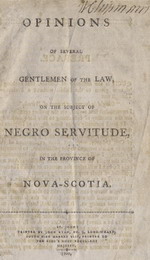
|
OPINIONS
ST. JOHN: 1802
|
|
Page 2 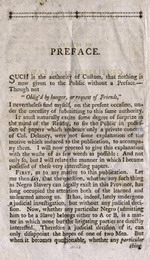
|
PREFACE. Such is the authority of Custom, that nothing is now given to the Public without a Preface.—Though not "Oblig'd by hunger, or request of Friends," I neverthless find myself, on the present occasion, under the necessity of submitting to this same authority. It must naturally excite some degree of surprize in the mind of the Reader to see the Public in possession of papers which embrace only a private concern of Col. Delancy, were not some explanation of the motive which induced to the publication, to accompany them. I will now proceed to give this explanation with the waste of as few words as possible : And not only so, but I will relate the manner in which I became possessed of these very interesting papers. First, as to my motive to this publication. Let me then say, that the question, whether any such thing as Negro Slavery can legally exist in this Province, has long occupied the attention both of the learned and unlearned among us. It has, indeed, lately undergone a judicial investigation, but without any judicial decision. Now, whether any particular Negro (admitting him to be a Slave) belongs either to A or B, is a matter in which none but the litigating parties are directly interested. Therefore a judicial decision of it, can only disappoint the hopes of one of two Men. But when it becomes questionable, whether any particular |
|
Page 3 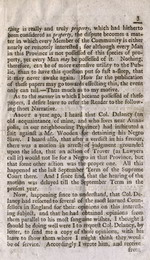
|
thing is really and truly property, which had hitherto been considered as property, the dispute becomes a matter in which every Member of the Community is either nearly or remotely interested ; for although every Man in this Province is not possessed of this species of property, yet every Man may be possessed of it. Nothing, therefore, can be of more extensive utility to the Public, than to have this question put so fast a-sleep, that it may never awake again. How far the publication of these papers may go towards effecting this, the event only can tell.—Thus much as to my motive. As to the manner in which I became possessed of these papers, I desire leave to refer the Reader to the following short Narrative. About a year ago, I heard that Col. Delancy (an old acquaintance of mine, and who lives near Annapolis, in our neighbouring Province) had instituted a suit against a Mr. Wooden for detaining his Negro Slave. I heard also, that after a verdict in his favour, there was a motion in arrest of judgment grounded upon the idea, that an action of Trover (as Lawyers call it) would not lie for a Negro in that Province, but that some other action was the proper one. All this happened at the last September Term of the Supreme Court there. And I since find, that the hearing of the motion was delayed till the September Term in the present year. Now, happening since to understand, that Col. Delancy had resorted to several of the most learned Counsellors in England for their opinions on this interesting subject, and that he had obtained opinions from them parallel to his most sanguine wishes, I thought I should be doing well were I to request Col. Delancy, by letter, to send me a copy or those opinions, with his leave to show them where I might think they would be of service. Accordingly I wrote him, and received |
|
Page 4 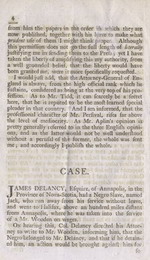
|
from him the papers in the order in which they are now published, together with his his leave to make what prudent use of them I might think proper. Although this permission does not go the full length of literally justifying me in sending them to the Press; yet I have taken the liberty of amplifying this my authority, from a well grounded belief, that the liberty would have been granted me, were it more specifically requested. I would just add, that the Attorney-General of England is always, from the high official rank which he sustains, considered as being at the very top of his profession. As to Mr. Tidd, it can scarcely be a secret here, that he is reputed to be the most learned special pleader in that country. And I am informed, that the professional character of Mr. Persival, rises far above the level of mediocrity. As Mr. Aplin's opinion is pretty generally referred to in the three English opinions, and as the latter would not be well understood without a perusal of the former, the whole was sent me ; and accordingly I publish the whole. CASE. JAMES DELANCY, Esquire, of Annapolis, in the Province of Nova-Scotia, had a Negro Slave, named Jack, who ran away from his service without leave, and went to Halifax, above an hundred miles distant from Annapolis, where he was taken into the service of a Mr. Wooden on wages. On hearing this, Col. Delancy directed his Attorney to write to Mr. Wooden, informing him, that the Negro belonged to Mr. Delancy, and that if he detained him, an action would be brought against him for |
|
Page 5 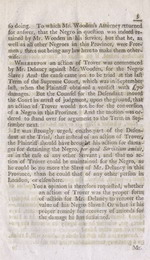
|
so doing. To which Mr. Wooden's Attorney returned for answer, that the Negro in question was indeed retained by Mr. Wooden in his service, but that he, as well as all other Negroes in this Province, were Freemen ; there not being any law here to make them otherwise. Whereupon an action of Trover was commenced by Mr. Delancy against Mr. Wooden, for the Negro Slave : And the cause came on to be tried at the last Term of the Supreme Court, which was in September last, when the Plaintiff obtained a verdict with £70 damages. But the Counsel for the Defendant moved the Court in arrest of judgment, upon the ground, that an action of Trover would not be for the conversion of a Negro in this Province. And the motion was ordered to stand over for argument to the Term in September next. It was strongly urged, on the part of the Defendant at the Trial, that instead of an action of Trover, the Plaintiff should have brought his action for damages for detaining the Negro, per quod Servitium amisit, as in the case of any other Servant ; and that no action of Trover could be maintained for the Negro, as he could be no more the Slave of Mr. Delancy in this Province, than he could that of any other person in London, or elsewhere. Your opinion is therefore requested, whether an action of Trover was the proper form of action for Mr. Delancy to recover the value of his Slave ? Or what is his proper remedy for recovery of amends for the damage he has sustained. |
|
Page 6 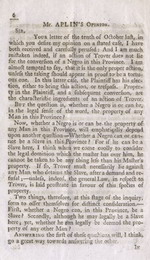
|
Mr. APLIN'S Opinion SIR, Your letter of the tenth of October last, in which you desire my opinion on a stated case, I have both received and carefully perused ; And I am much mistaken indeed, if an action of Trover does not lie for the conversion of a Negro in this Province. I am almost tempted to say, that it is the only proper action, unless the taking should appear in proof to be a tortuous one. In this latter case, the Plaintiff has his election, either to bring this action, or trespass. Property in the Plaintiff, and a subsequent conversion, are the characteristic ingredients of an action of Trover. But the question is, whether a Negro is or can be, in the legal sense of the word, the property of any Man in this Province ? Now, whether a Negro is or can be the property of any Man in this Province, will emphatically depend upon another question —Whether a Negro can or cannot be a Slave in this Province ? For if he can be a Slave here, I think when we come coolly to consider the legal dominion which the master has over him, he cannot be taken to be any thing less than his Master's property. If so, Trover must necessarily lie against any Man who detains the Slave, after a demand and refusal;—unless, indeed, the general Law, in respect to Trover, is laid prostrate in favour of this species of property. Two things, therefore, at this stage of the inquiry, seem to offer themselves for distinct consideration.—First, whether a Negro can, in this Province, be a Slave? Secondly, although he may legally be a Slave here; yet, whether he can legally be deemed the property of any other Man ? Answering the first of these questions will, I think, go a great way towards answering the other. |
|
Page 7 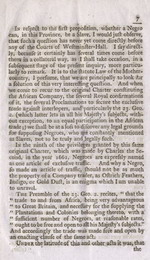
|
In respect to the first proposition, whether a Negro can, in this Province, be a Slave, I would just observe, that such a question has never yet come directly before any of the Courts of Westminster-Hall. I say directly, because it certainly has several times come before them in a collateral way, as I shall take occasion, in a subsequent stage of the present inquiry, more particularly to remark. It is to the statute Law of the Mother-country, I presume, that we are principally to look for a solution of this very interesting question. And when we come to recur to the original Charter constituting the African Company, the several Royal confirmations of it, the several Proclamations to secure the exclusive trade against interlopers, and particularly the 23. Geo. 2. (which latter lets in all his Majesty's subjects, without exception, to an equal participation in the African trade;) we shall be at a loss to discover any legal grounds for supposing Negroes, who are constantly mentioned as Slaves, not to be truly and legally such. In the ninth of the privileges granted by this same original Charter, which was made by Charles the Second, in the year 1661, Negroes are expressly named as one article of exclusive traffic. And why a Negro, so made an article of traffic, should not be as much the property of a Company trader, as Ostrich Feathers, Indigo, or Gold Dust, is an enigma which I am unable to unravel. The Preamble of the 23. Geo. 2, recites, "that the trade to and from Africa, being very advantageous to Great Britain, and necessary for the supplying the Plantations and Colonies belonging thereto, with a sufficient number of Negroes, at reasonable rates, ought to be free and open to all his Majesty's subjects." And accordingly the trade was made free and open by an enacting clause of the same act. Under the latitude of this and other acts it was, that |
|
Page 8 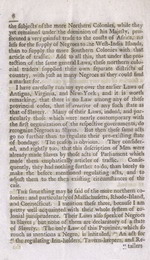
|
the subjects of the more Northern Colonies, while they yet remained under the dominion of his Majesty, prosecuted a very gainful trade to the coasts of Africa, no less for the supply of Negroes to the West-India Islands, than to supply the more Southern Colonies with that article of traffic. Add to all this, that under the protection of the same general Laws, these northern colonial traders supplied their own separate districts of country, with just as many Negroes as they could find a market for. I have carefully run my eye over the earlier Laws of Antigua, Virginia, and New-York ; and it is worth remarking, that there is no Law among any of these provincial codes, that is creative of any such state as that of Slavery. Many of their Laws, indeed, and particularly those which were nearly contemporary with the first organization of the respective governments, do recognize Negroes as Slaves. But then these same acts go no further than to regulate their pre-existing state of bondage. The reason is obvious. They considered, and rightly too, that this description of Men were already made Slaves by those acts of Parliament which made them emphatically articles of traffic. Consequently, they had nothing further to do, than barely to make the before mentioned regulating acts, and to adjust them to the then existing circumstances of the case. The same thing may be said of the more northern colonies : and particularly of Massachusetts, Rhode-Island, and Connecticut. I mention these three, because I am pretty well acquainted with their whole system of colonial jurisprudence. Their Laws also speak of Negroes as Slaves ; but none of them are declaratory of a state of Slavery. The only Law of this Province, which so much as mentions a Negro, is intituled, "An act for the regulating Inn-holders, Tavern-keepers, and |
|
Page 9 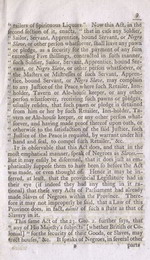
|
Retailers of Spirituous Liquors." Now this Act, in the second section of it, enacts, "that in case any Soldier, Sailor, Servant, Apprentice, bound Servant, or Negro Slave, or other person whatsoever, shall leave any pawn or pledge, as a security for the payment of any sum exceeding Five shillings, contracted in such manner, such Soldier, Sailor, Servant, Apprentice, bound Servant, or Negro Slave, or other person whatsoever, or the Masters or Mistresses of such Servant, Apprentice, bound Servant, or Negro Slave, may complain to any Justice of the Peace where such Retailer, Inn-holder, Tavern or Ale-house keeper, or any other person whatsoever, receiving such pawns or pledges, usually resides, that such pawn or pledge is detained from him or her by such Retailer, Inn-holder, Tavern or Ale-house keeper, or any other person whatsoever, and having made proof thereof upon oath, or otherwise to the satisfaction of the said Justice, such Justice of the Peace is required, by warrant under his hand and seal, to compel such Retailer," &c. It is observable that this Act does, and that in the most emphatical manner, speak of Negroes as Slaves—But it may easily be discerned, that it does just as emphatically suppose them to have been so before the Act was made, or even thought of. Hence it may be inferred, at least, that the provincial Legislature had in their eye (if indeed they had any thing in it rational) that these very Acts of Parliament had already made Slaves of Negroes within the Province. Therefore it may not improperly be said, that a Law of this Province does, in fact, admit of such a state as that of Slavery in it. This same Act of the 23. Geo. 2. further says, that "any of His Majesty's subjects" [whether British or Colonial] "for the security of their Goods, or Slaves, may erect houses," &c, It speaks of Negroes, in several other |
|
Page 10 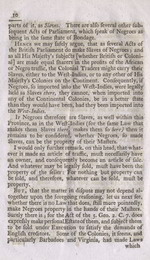
|
parts of it, as Slaves. There are also several other subsequent Acts of Parliament, which speak of Negroes as being in the same state of Bondage. Hence we may safely argue, that as several Acts of the British Parliament do make Slaves of Negroes ; and as all His Majesty's subjects [whether British or Colonial] are made equal sharers in the profits of the African or Negro traffic, the Colonial Traders might carry their Slaves, either to the West-Indies, or to any other of His Majesty's Colonies on the Continent. Consequently, if Negroes, so imported into the Weft-Indies, were legally held as Slaves there, they cannot, when imported into any of the Continental Colonies, be in a better state than they would have been, had they been imported into the West-Indies. If Negroes therefore are Slaves, as well within this Province, as in the Weft-Indies (for the same Law that makes them Slaves there, makes them so here) then it remains to be considered, whether Negroes, so made Slaves, can be the property of their Masters. I would only further remark, on this head, that whatever is made an article of traffic, must necessarily have an owner, and consequently become an article of sale. And whatever may be legally sold, must have been the property of the seller : For nothing but property can be sold, and therefore, whatever can be sold, must be property. But, that the matter in dispute may not depend altogether upon the foregoing reasoning, let us next see, whether there is no Law that does, still more pointedly, make Negroes property in the hands of their Masters. Surely there is ; for the Act of the 5. Geo. 2. C. 7. does expressly make personal Estate of them, and subject them to be sold under Execution to satisfy the demands of English creditors. Some of the Colonies, it seems, and particularly Barbadoes and Virginia, had made Laws |
|
Page 11 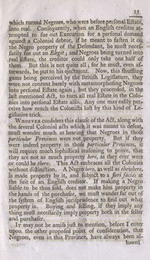
|
which turned Negroes, who were before personal Estate, into real. Consequently, when an English creditor attempted to sue out Execution for a personal demand against a Colonial debtor, if he meant to fatten it on the Negro property of the Defendant, he must necessarily sue out an Elegit ; and Negroes being turned into real Estate, the creditor could only take one half of them. But this is not quite all ; for he must, even afterwards, be put to his ejectment. Now, this shuffling game being perceived by the British Legislature, they were not content barely with metamorphosing Negroes into personal Estate again ; but they proceeded, in the last mentioned Act, to turn all real Estate in the Colonies into personal Estate also. Any one may easily perceive how much the Colonists lost by this kind of Legislative trick. Whoever considers this clause of the Act, along with the several Colonial acts which it was meant to defeat, must wonder much at hearing that Negroes in those particular Provinces were not property. But if they were indeed property in those particular Provinces, it will require much sophistical reasoning to prove, that they are not as much property here, as they ever were or could be there This Act embraces all the Colonies without distinction. A Negro here, as well as elsewhere, is made property by it, and subject to a fieri facias at the suit of an English creditor. If making a Negro liable to be thus sold, does not make him property in the hands of the purchaser, we must wander far out of the system of English jurisprudence to find out what property is. Buying and selling, if they imply any thing must necessarily imply property both in the seller and purchaser. It may not be amiss just to mention, before I enter upon the other proposed point of consideration, that Negroes, even in this Province, have always been |
|
Page 12 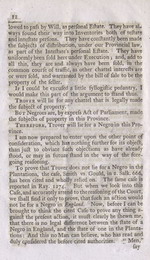
|
allowed to pass by Will, as personal Estate. They have always found their way into Inventories both of testate and intestate persons. They have constantly been made the subjects of distribution, under our Provincial law, as part of the Intestate's personal Estate. They have uniformly been sold hereunder Execution; and, add to all this, they are and always have been sold, in the common course of traffic, as other chattel interests are or were sold, and warranted by the bill of sale to be the property of the seller. If I could be excused a little syllogistic pedantry, I would make this part of the argument to hand thus. Trover will lie for any chattel that is legally made the subject of property. But Negroes are, by express Act of Parliament, made the subjects of property in this Province. Therefore, Trover will lie for a Negro in this Province. I am now prepared to enter upon the other point of consideration, which has nothing further for its object, than just to obviate such objections as have already stood, or may in future stand in the way of the foregoing reasoning. To prove that Trover does not lie for a Negro in the Plantations, the case, Smith vs. Gould, in 2. Salk. 666, has been cited and wholly relied on. The same case is reported in Ray. 1274. But when we look into this Case, and accurately attend to the reasoning of the Court, we shall find it only to prove, that such an action would not lie for a Negro in England. Now, before I can be brought to think the cited Case to prove any thing against the present action, it must clearly be shewn me, that there is no legal difference between the state of a Negro in England, and the state of one in the Plantations : And this no Man can believe, who has read and duly considered the before cited authorities. "Men," |
|
Page 13 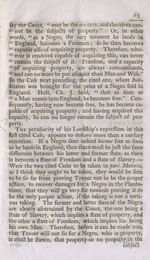
|
say the Court, "may be the owners, and therefore cannot be the subjects of property." Or, in other words, "as a Negro, the very moment he lands in England, becomes a Freeman ; so he then becomes capable also of acquiring property. Therefore, whoever is rendered capable of acquiring this, can never remain the subject of it. Freedom, and a capacity of acquiring property, are always concomitants, and can no more be put asunder than Man and Wife." In the Case next preceding, the cited one, where Indebitatees was brought for the price of a Negro sold in England. Holt, Ch. J. held, "that as soon as a Man comes into England, he becomes free." Consequently, having now become free, he has become capable of acquiring property; and having acquired this capacity, he can no longer remain the subject of property. The peculiarity of his Lordship's expression in this last cited Case, appears to deserve more than a cursory attention. If a Negro does indeed become free as soon as he lands in England, then there must be just the same difference between his latter and former state, as there is between a state of Freedom and a state of Slavery.—Were the two cited Cases to be taken in pari Materia, as I think they ought to be taken, they would be seen to be so far from proving Trover not to be the proper action, to recover damages for a Negro in the Plantations, that they will go very far towards proving it to be the only proper action, if the taking is not a tortious taking. The former and latter state of the Negro are clearly ascertained by the Court, the one being a state of Slavery, which implies a state of property, and the other a state of Freedom, which implies his being his own Man. Therefore, before it can be made out, that Trover will not lie for a Negro, who is property, it must be shewn, that property or no property in the |
|
Page 14 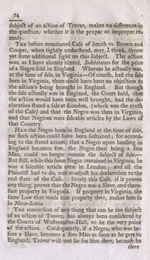
|
subject of an action of Trover, makes no difference in the question, whether it is the proper or improper remedy. The before mentioned Case of Smith vs. Brown and Cooper, when rightly understood, may, I think, throw yet some additional light on this subject. The action was, as I have already hinted, Indebitatees for the price of a Negro sold in England. Whereas he actually was, at the time of sale, in Virginia—Of course, had the sale been in Virginia, there could have been no objection to the action's being brought in England. But though the sale actually was in England, the Court held, that the action would have been well brought, had the declaration stated a sale at London, (which was the truth of the Case) and that the Negro was then in Virginia, and that Negroes were saleable articles by the Laws of that Country. Had the Negro been in England at the time of sale, no such action could have been sustained ; for according to the stated axiom, that a Negro upon landing in England becomes free, the Negro then being a free Man, could no longer remain the subject of sale.—But still, while this same Negro remained in Virginia, he was a saleable article even in London ; and all the Plaintiff had to do, was to adjust his declaration to the real state of the Case. Surely this Case, if it proves any thing, proves that the Negro was a Slave, and therefore property in Virginia. If property in Virginia, the same Law that made him property there, makes him so in Nova-Scotia. The conversion of any thing that can be the subject of an action of Trover, has always been considered by the Courts of Westminster-Hall, to be the very point of the action. Consequently, if a Negro, who was before a Slave, becomes a free Man as soon as he gets to England, Trover will not lie for him there, because he |
|
Page 15 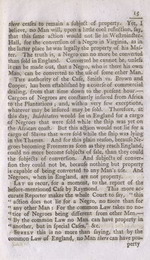
|
there ceases to remain a subject of property. Yet, I believe, no Man will, upon a little cool reflection, say, that this same anion would not lie in Westminster-Hall, for the conversion of a Negro in Virginia, as the latter place he was legally the property of his Master. The truth is, a Negro can no more be converted than sold in England. Converted he cannot be, unless it can be made out, that a Negro, who is there his own Man, can be converted to the use of some other Man. The authority of the Case, Smith vs. Brown and Cooper, has been established by a course of commercial dealing, from that time down to the present hour.—Cargoes of Negroes are constantly insured from Africa to the Plantations ; and, with a very few exceptions, whatever may be insured may be sold. Therefore, at this day, Indebitatees would lie in England for a cargo of Negroes that were sold while the ship was yet on the African coast. But this action would not lie for a Cargo of Slaves that were sold while the ship was lying in the Thames. And for this plain reason, because Negroes becoming Freemen as soon as they reach England, could no more become subjects of sale, than they could the subjects of conversion. And subjects of conversion they could not be, because nothing but property is capable of being converted to any Man's use. And Negroes, when in England, are not property. Let us recur, for a moment, to the report of the before-mentioned Case by Raymond. This more accurate Reporter makes the whole Court to say, "this action does not lie for a Negro, no more than for any other Man : For the common Law takes no notice of Negroes being different from other Men.—By the common Law no Man can have property in another, but in special Cases," &c. Surely this is no more than saying, that by the common Law of England, no Man there can have |
|
Page 16 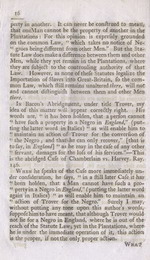
|
property in another. It can never be construed to mean, that one Man cannot be the property of another in the Plantations : For this opinion is expressly grounded on the common Law, "which takes no notice of Negroes being different from other Men." But the Statute Law does make a difference between them and other Men, while they yet remain in the Plantations, where they are subject to the controuling authority of that Law. However, as none of these Statutes legalize the Importation of Slaves into Great-Britain, so the common Law, which still remains unaltered there, will not and cannot distinguish between them and other Men there. In Bacon's Abridgement, under title Trover, my idea of this matter will appear correctly right. His words are, "it has been holden, that a person cannot have such a property in a Negro in England," (putting the latter word in Italics) "as will enable him to maintain an action of Trover for the conversion of the Negro ; and that lie can only recover," [that is to say, in England] "as he may in the case of any other servant, damages for the loss of his services." —This is the abridged Case of Chamberlain vs. Harvey. Ray. 146. When he speaks of the Case more immediately under consideration, he says, "in a still later Case it has been holden, that a Man cannot have such a property in a Negro in England," (putting the latter word again in Italics) "as will enable him to maintain an action of Trover for the Negro." Surely I may, without putting any tone upon this author's, suppose him to have meant, that although Trover would not lie for a Negro in England, where he is out of the reach of the Statute Law; yet in the Plantations, where he is under the immediate operation of it, this action; is the proper, if not the only proper action.
|
|
Page 17 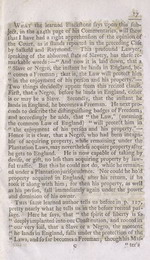
|
What the learned Blackstone says upon this subject, in the 424th page of his Commentaries, will shew that I have had a right apprehension of the opinion of the Court, as it stands reported in the preceding Case by Salkeld and Raymond. This profound Lawyer, speaking of the abhorred state of Slavery, has these remarkable words :— "And now it is laid down, that a Slave or Negro, the instant he lands in England, becomes a Freeman ; that is, the Law will protect him in the enjoyment of his person and his property." —Two things decidedly appear from this recited clause. First, that a Negro, before he lands in England, either is or may be a Slave. Secondly, that the instant he lands in England, he becomes Freeman. He next proceeds to describe the distinguishing badges of Freedom ; and accordingly he adds, that "the Law," (meaning the common Law of England) "will protect him in the enjoyment of his person and his property." — Hence it is clear, that a Negro, who had been incapable of acquiring property, while remaining under the Plantation Laws, may nevertheless acquire property after he gets to England. He is now capable of taking by devise, or gift, no less than acquiring property by lawful traffic. But this he could not do, while he remained under a Plantation jurisprudence. Nor could he hold property acquired in England, after his return, if he took it along with him ; for then his property, as well as his person, fall immediately again under the power and dominion of his owner. This same learned author tells us before in p. 127, pretty nearly what he tells us in the before recited passage. Here he says, that "the spirit of liberty is so deeply implanted into our Constitution, and rooted in our very soil, that a Slave or a Negro, the moment he lands in England, falls under the protection of the Laws, and so far becomes a Freeman; though his |
|
Page 18 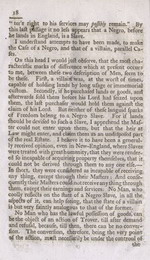
|
Master's right to his services may possibly remain." By this last passage it no less appears that a Negro, before he lands in England, is a Slave. I understand attempts to have been made, to make the Case of a Negro, and that of a villain, parallel Cases. On this head I would just observe, that the most characteristic marks of difference which at present occurs to me, between these two description of Men, seem to be these. First, a villain was, at the worst of times, capable of holding lands by long usage or immemorial custom. Secondly, if he purchased lands or goods, and afterwards sold them before his Lord had seized upon them, the last purchaser would hold them against the claim of his Lord. But neither of these languid sparks of Freedom belong to a Negro Slave. For if lands should be devised to such a Slave, I apprehend the Master could not enter upon them; but that the heir at Law might enter, and claim them as an undisposed part of the real Estate. I believe it to have been a generally received opinion, even in New-England, where Slaves were treated with great humanity, that they were rendered so incapable of acquiring property themselves, that it could not be derived through them to any one else.—In short, they were considered as incapable of receiving any thing, except through their Masters : And consequently their Masters could not receive any thing through them, except their earnings and services. No Man, who coolly reflects on the state of a Negro Slave, in all the aspects of it, can help seeing, that the state of a villain is but very faintly analogous to that of the former. No Man who has the lawful possession of goods, can be the object of an action of Trover, till after demand and refusal, because, till then, there can be no conversion. The conversion, therefore, being the very point of the action, must necessarily be under the controul of |
|
Page 19 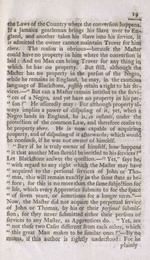
|
the Laws of the Country where the conversion happens. If a Jamaica gentleman brings his Slave over to England, and another takes his Slave into his service, it is admitted the owner cannot maintain Trover for him, there. The reason is obvious—because the Master could have no property in him where the conversion is laid : And no Man can bring Trover for any thing in which he has no property. But still, although the Master has no property in the person of the Negro, while he remains in England, he may, in the cautious language of Blackstone, possibly retain a right to his services.— "But can a Master remain intitled to the services of a Negro, and yet have no property in his person ?" He assuredly may : For although property always implies a power of disposing of it, yet, when a Negro lands in England, he is, co instanti, under the protection of the common Law, and therefore ceases to be property there. He is now capable of acquiring property, and of disposing of it afterwards; which would be nonsense, if he was not owner of himself. "But if he is truly owner of himself, how happens it that another Man should be intitled to his services ?" Let Blackstone answer the question.— "Yet," says he, "with regard to any right which the Master may have acquired to the personal services of John or Thomas, this will remain exactly in the same state as before ; for this is no more than the fame subjection for life, which every Apprentice submits to for the space of seven years, or sometimes for a longer term." —Now, the Master did not acquire the perpetual service of John or Thomas, by his or their personal submission; for they never submitted either their persons or services to any Master, as Apprentices do. "Yet, are not these two Cases different from each other, which this great Man makes to be similar ones ?" —By no means, if this author is rightly understood : For he |
|
Page 20 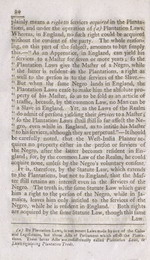
|
plainly means a right to services acquired in the Plantations, and under the operation of Plantation Laws. Whereas, in England, no such right could be acquired without the consent of the party. The whole reasoning, on this part of the subject, amounts to but simply this.— "As an Apprentice, in England, can yield his services to a Master for seven or more years ; so the Plantation Laws give the Master of a Negro, while the latter is resident in the Plantations, a right as well to the person as to the services of the Slave.— But when the same Negro lands in England, the Plantation Laws cease to make him the absolute property of his Master, so as to be sold as an article of traffic, because, by the common Law, no Man can be a Slave in England. Yet, as the Laws of the Realm do admit of persons yielding their services to a Master, so the Plantation Laws shall still so far affect the Negro, even while in England, as to intitle his Master to his services, although they are perpetual." —It should be carefully noted, that the West-India Planter acquires no property either in the person or services of the Negro, after the latter becomes resident in England ; for, by the common Law of the Realm, he could acquire none, unless by the Negro's voluntary consent. It is, therefore, by the Statute Law, which extends to the Plantations, but not to England, that the Master still retains an interest even in the services of the Negro. The truth is, the same Statute Law which gave him a right to the person of the Negro, while in Jamaica, leaves him only intitled to the services of the Negro, while he is resident in England. Both rights are acquired by the same Statute Law, though this same |
|
Page 21 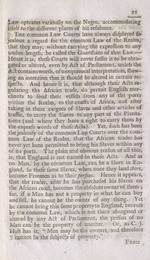
|
Law operates variously on the Negro, accommodating itself to the different places of his residence. The common Law Courts have always displayed so jealous a regard for the common Law of the Realm, that they may, without carrying the expression to any undue length, be called the Guardians of that Law.—Hence it is, these Courts will never suffer it to be abrogated or altered, even by Act of Parliament, unless the Act contains words, of unequivocal interpretation, shewing an intention that it should be altered in certain respects. And hence it is, that although these Acts regulating the African trade, do permit English merchants to send their vessels from any of the ports within the Realm, to the coasts of Africa, and after taking in there cargoes of Slaves and other articles of traffic, to carry the Slaves to any part of the Plantations (and where they have a right to carry them by the express words of those Acts). Yet, such has been the jealousy of the common Law Courts over the common Law of the Realm, that the African trader has never yet been permitted to bring his Slaves within any of its Ports. The plain and obvious reason of all this, is, that England is not named in those Acts. And as no Man, by the common Law, can be a Slave in England, so these same Slaves, when once they land there, become Freemen as to their persons. Hence it appears, that the trader, after he has purchased his Slaves on the African coast, becomes the absolute owner of them ; for, if a Man has not a property in what he can buy and sell, he cannot be the owner of any thing. Yet he cannot bring this same property to England, because by the common Law, which is not there abrogated or altered by any Act of Parliament, the person of no Man can be the property of another. Or, as C. J. Holt has it, "Men may be the owners, and therefore cannot of be the subjects of property."
|
|
Page 22 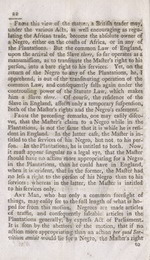
|
From this view of the matter, a British trader may, under the various Acts, as well encouraging as regulating the African trade, become the absolute owner of a Negro, either on the coasts of Africa, or in any of the Plantations. But the common Law of England, upon the arrival of the Slave there, so far operates as a manumission, as to transmute the Master's right to his person, into a bare right to his services. Yet, on the return of the Negro to any of the Plantations, he, I apprehend, is out of the transmuting operation of the common Law, and consequently falls again under the controuling power of the Statute Law, which makes him a Slave there. Of course, the residence of the Slave in England, affects only a temporary suspension, both of the Master's rights and the Negro's easement. From the preceding remarks, one may easily discover, that the Master's claim to a Negro while in the Plantations, is not the same that it is while he is resident in England. In the latter case, the Master is intitled to the services of his Negro, but not to his person. In the Plantations, he is intitled to both. Now, it must appear singular to a legal eye, that the Master should have no action more appropriating for a Negro in the Plantations, than he could have in England, when it is evident, that in the former, the Master had no less a a right to the person of his Negro than to his services : whereas in the latter, the Master is intitled to his services only. Any Man, who has only a common foresight of things may easily see to the full length of what is hoped for from this motion. Negroes are made articles of traffic, and consequently saleable articles in the Plantations generally; by express Act of Parliament. It is seen by the abettors of the motion, that if no action more appropriating than an action per quod Servitium amisit would lie for a Negro, the Master's right |
|
Page 23 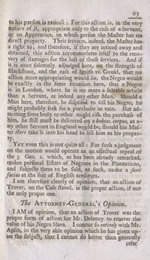
|
to his person is extinct. For this action is, in the very nature of it, appropriate only to the case of a Servant, or an Apprentice, in whose person the Master has no direct property. Their services, indeed, the Master has a right to ; and therefore, if they are inticed away and detained, this action accommodates itself to the recovery of damages for the loss of those services. And if it is once solemnly adjudged here, on the strength of Blackstone, and the case of Smith vs. Gould, that no action more appropriating would lie, the Negro would be exactly in the same situation here, that a Negro is in London, where he is no more a saleable article than a Servant, or indeed any other Man. Should a Man here, therefore, be disposed to sell his Negro, he might probably seek for a purchaser in vain. But admitting some body or other might risk the purchase of him, he still must be delivered on a habeas corpus, as any other Servant in England would be, should his Master there take it into his head to sell him as his property. Yet even this is not quite all : For such a judgment on the motion would operate as an effectual repeal of the 5. Geo. 2. which, as has been already remarked, makes personal Estate of Negroes in the Plantations, and subjects them to be sold, as such, under a fieri facias at the suit of English creditors. I am therefore clearly of opinion, that an action of Trover, on the Case stated, is the proper action, if not the only proper one. The Attorney-General's Opinion. I AM of opinion, that an action of Trover was the proper form of action for Mr. Delancy to recover the value of his Negro Slave. I concur so entirely with Mr. Aplin, in the very able opinion which he has given upon the subject, that I cannot do better than generally |
|
Page 24 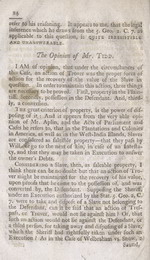
|
refer to his reasoning. It appears to me, that the legal inference which he draws from the 5. Geo. 2. C. 7. as applicable to this question, is quite irresistible and unanswerable. The Opinion of Mr. TIDD. I AM of opinion, that under the circumstances of this Case, an action of Trover was the proper form of action for the recovery of the value of the Slave in question. In order to maintain this action, three things are necessary to be proved. First, property in the Plaintiff. Secondly, possession in the Defendant. And, thirdly, a conversion. The great criterion of property, is the power of disposing of it : And it appears from the very able opinion of Mr. Aplin, and the Acts of Parliament and Cases he refers to, that in the Plantations and Colonies in America, as well as in the West-India Islands, Slaves are considered as saleable property—that they pass by Will, or go to the next of kin, in case of an Intestacy, and that they may be taken in Execution to answer the owner's Debts. Considering a Slave, then, as saleable property, I think there can be no doubt but that an action of Trover might be maintained for the recovery of his value, upon proofs that he came to the possession of, and was converted by, the Defendant. Supposing the Sheriff, under an Execution, authorized by the Stat. 5. Geo. 2, C. 7. were to take and dispose of a Slave not belonging to the Defendant, can it be said that an action of Trespass, or Trover, would not lie against him ? Or, that such an action would not lie against the Defendant, or a third person, for taking away and disposing of a Slave, which the Sheriff had rightfully taken under such an Execution ? As in the Case of Welbraham vs. Snow, 2 |
|
Page 25 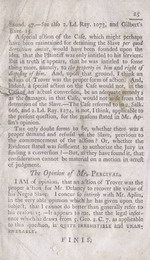
|
Saund. 47.—See also 2. Ld. Ray. 1073, and Gilbert's Exec. 15. A special action of the Case, which might perhaps have been maintained for detaining the Slave per quod Servitium amisit, would have been founded upon the idea, that the Plaintiff was only intitled to his services. But in truth it appears, that he was intitled to some thing more, namely, to the property in him and right of disposing of him. And, upon that ground, I think an action of Trover was the proper form of action. And, indeed, a special action on the Case would not, in the Case of an actual conversion, be an adequate remedy; as the damages, in that Case, would not arise from the detention of the Slave.—The Case referred to in 2. Salk. 666, and 2. Ld. Ray. 1274, is not, I think, applicable to the present question, for the reasons stated in Mr. Aplin's opinion. The only doubt seems to be, whether there was a proper demand and refusal of the Slave, previous to the commencement of the action ? Or, whether the Evidence stated was sufficient to authorize the jury in finding a conversion ?—But, as they have found it, that consideration cannot be material on a motion in arrest of judgment. The Opinion of Mr. PERCIVAL. I am of opinion, that an action of Trover was the proper action for Mr. Delancy to recover the value of his Negro Slave. I concur so intirely with Mr. Aplin in the very able opinion which he has given upon the subject that I cannot do better than generally refer to his reasoning.—It appears to me, that the legal inference which he draws from 5. Geo. 2. C. 7. as applicable to this question, is quite irresistible and unanswerable. FINIS. |
